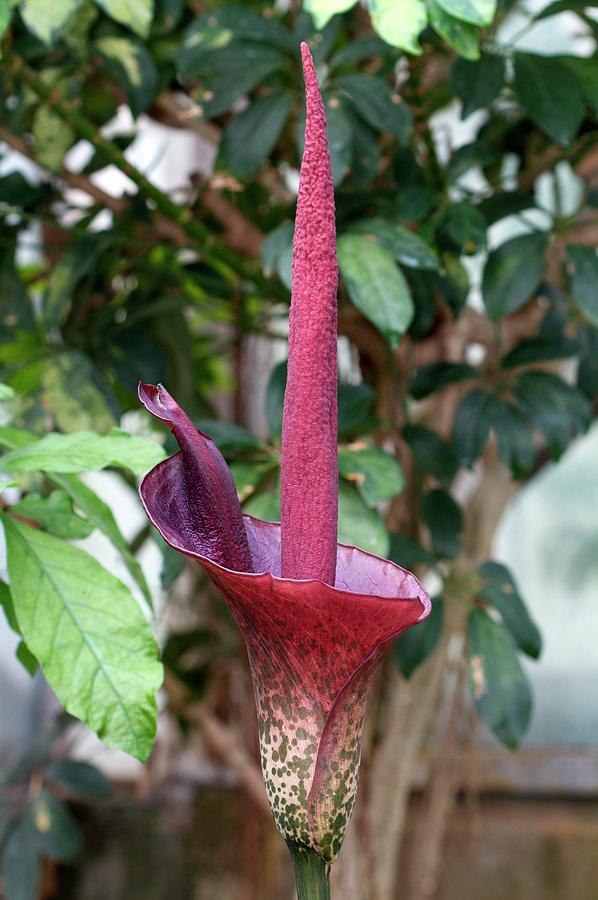
Amorphophallus Rivieri 'konjac' Photograph by Sam K Tran/science Photo Library
Amorphophallus konjac (syn. Amorphophallus rivieri) is a widespread species from the eastern Himalayas to China and the Philippines. The first 2 photos were taken by Angelo Porcelli of plants that used to be known by the name Amorphophallus rivieri var. konjac. It is known by common names of Snake's tongue or snake palm.

BestandAmorphophallus konjac BotGardDresden070219InflorescenceB.jpg Wikipedia
A. konjac is a tuberous perennial with erect, ovate, purple-brown spathes borne on spotted stalks in summer followed by orange-red berries. The flower and fruit are followed by a single, large, dissected leaf with elliptic, mid-green leaflets borne on a mottled, olive-green and brownish-white leaf stalk.
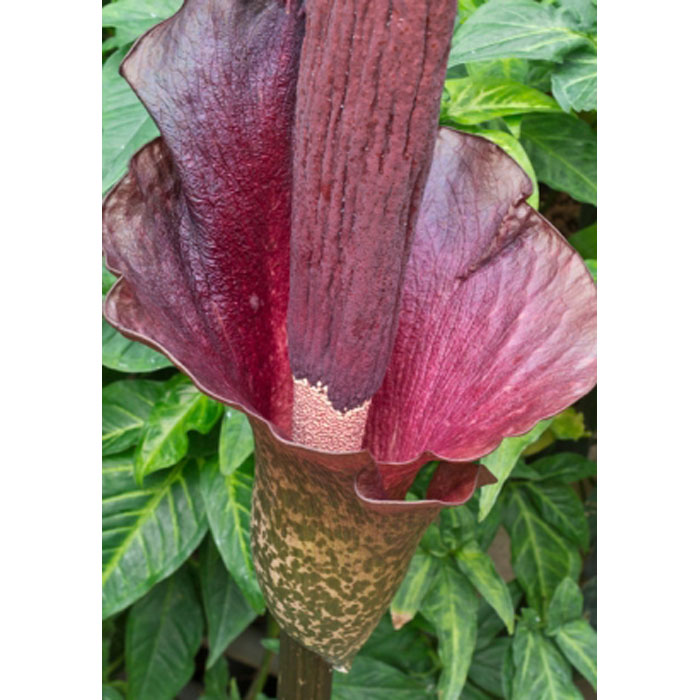
20062 Amorphophallus konjac syn. rivieri Κονγιάκ Γλώσσα του διαβόλου Valentine
Amorphophallus konjac Taxonomy ID: 78372 (for references in articles please use NCBI:txid78372) current name Amorphophalluskonjac K.Koch, 1858

Amorphophallus Konjac [rivieri]
Amorphophallus konjac in bloom Amorphophallus konjac male (top) and female (bottom) flowers Japanese konjac gel, with hijiki seaweed mixed in Konjac corm used for preparing food Sashimi konnyaku, usually served with a miso -based dipping sauce rather than soy sauce

Amorphophallus konjac rare plant tuber Etsy
Amorphophallus konjac : A broadleaf deciduous perennial aroid bulb / corm / tuber with green foliage and purple and black flowers in spring. To grow well, it prefers bright shade - shade and regular water. Prefers to be dry when dormant. Grows best in well-drained, rich and average soil. In need of something humidity tolerant, heat tolerant and verticillium wilt resistant?
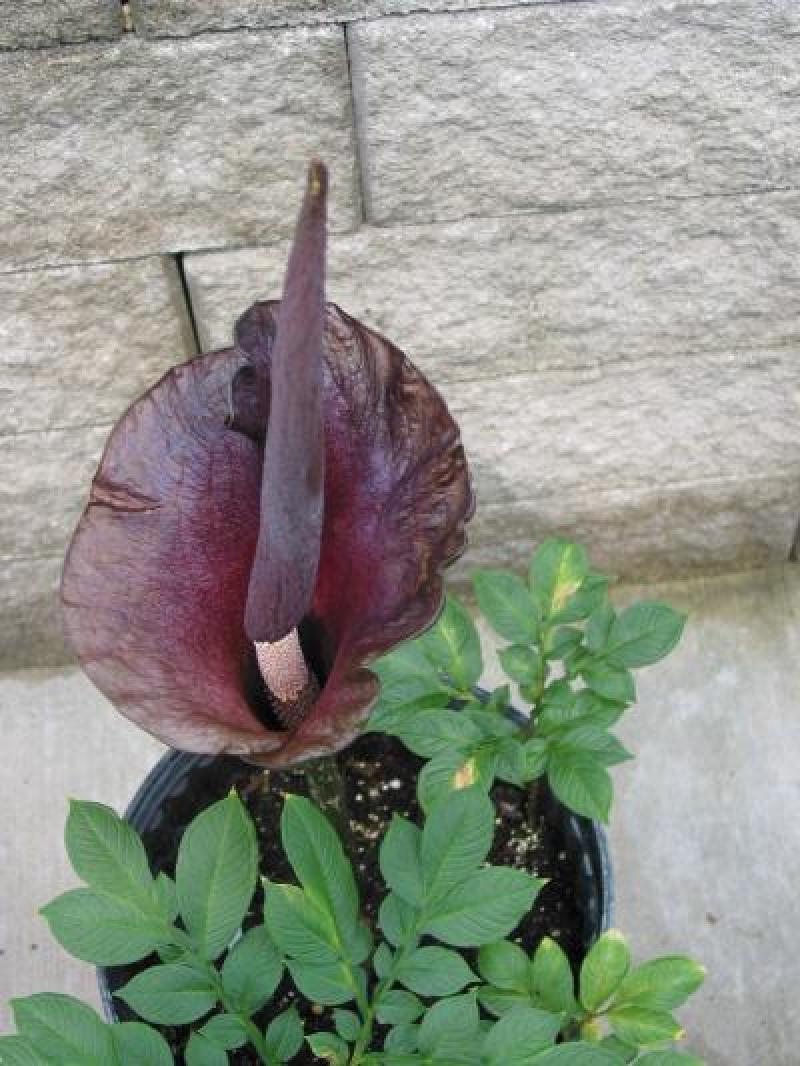
Special Exhibit Biological Sciences Greenhouse
A heavy stalk bears a large, shiny, deep maroon and ruffled 3-foot spathe (looking a little like vinyl car upholstery) that surrounds a longer pale green to purple or mottled spadix—a bit shocking really. Incidentally, the bloom produces an odor like carrion to attract pollinating flies. Wow your friends and neighbors with this rare plant and.

Flower Gallery Elephant Foot コンニャク (蒟蒻、菎蒻 Amorphophallus rivieri var. konjac)
Amorphophallus (from Ancient Greek amorphos, "without form, misshapen" + phallos, "penis", referring to the shape of the prominent spadix) is a large genus of some 200 tropical and subtropical tuberous herbaceous plants from the Arum family ( Araceae ), native to Asia, Africa, Australia and various oceanic islands.
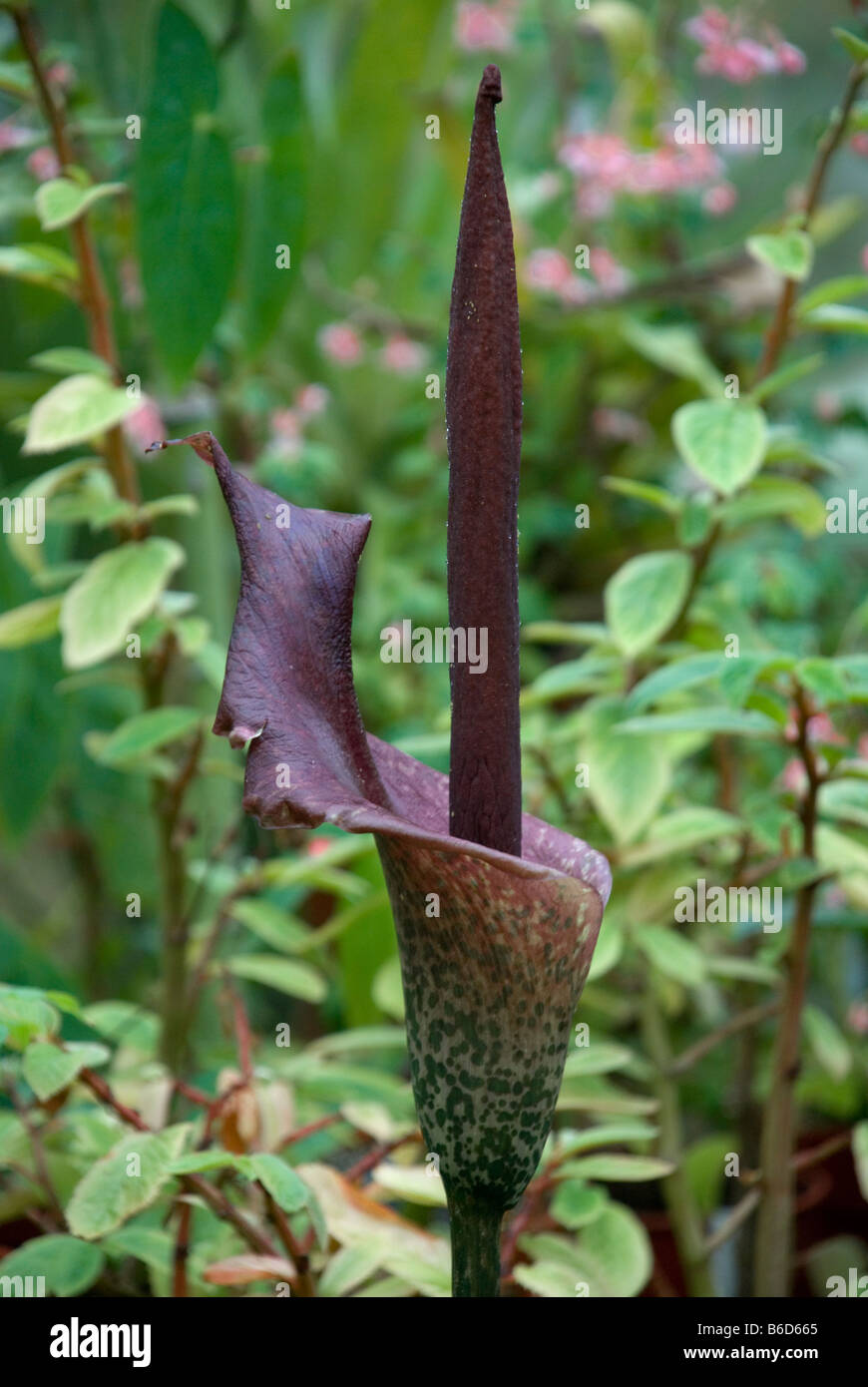
AMORPHOPHALLUS (RIVIERI) KONJAC Stock Photo Alamy
Amorphophallus konjac K. Koch, synonym A. rivieri Durieu, has been used in China, Japan, and South East Asia for thousands of years as an important crop plant and traditional medicine (Li and Long Citation 1998, Li et al. Citation 2010; Chua et al. Citation 2010).Currently, there was no complete chloroplast genome sequence of any species from genus Amorphophallus available in the GenBank database.

Voodoo Lily (Amorphophallus) Rivieri 'Konjac' Фиолетовые растения, Цветение, Растения
Amorphophallus konjac, or Voodoo Lily, is a herbaceous, cormous, perennial plant found in forest margins and thickets in China. It has glossy brown edible corms (bobo-tuber) that produce rhizomatous offsets each year. The plant is widely cultivated in Japan and China as food source and as an ornamental.
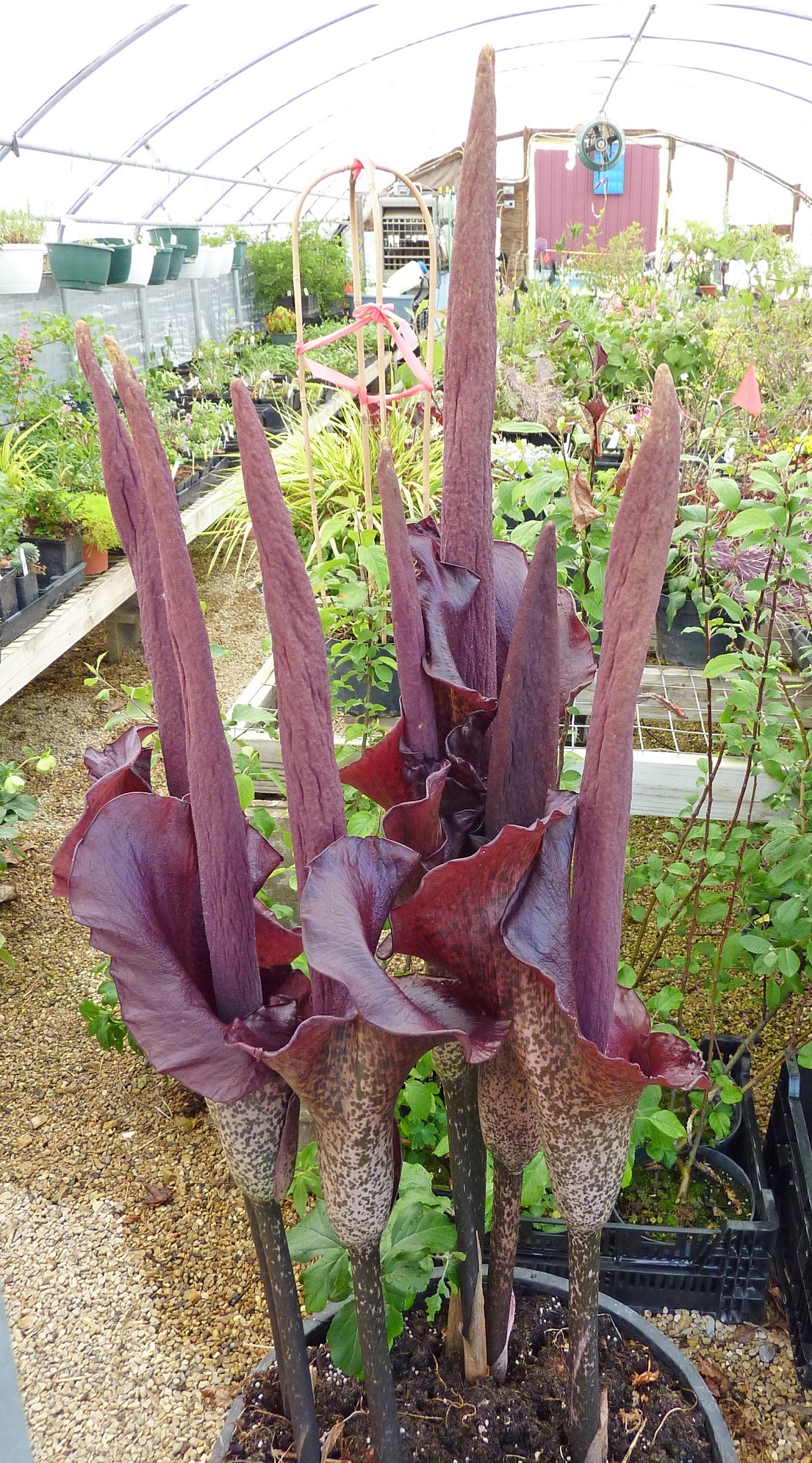
Amorphophallus konjac Can You Resist the Lure of the Devil’s Tongue? Tropical Biodiversity
Amorphophallus konjac K. Koch is one of the most widely used species, belonging to the Araceae family. Amorphophallus rivieri Durand ex Carriere or konjac are its synonyms. It is commonly called "ju ruo" in Chinese, "konnyaku" (yam cake) in Japanese, and "gonyak" in Korean.
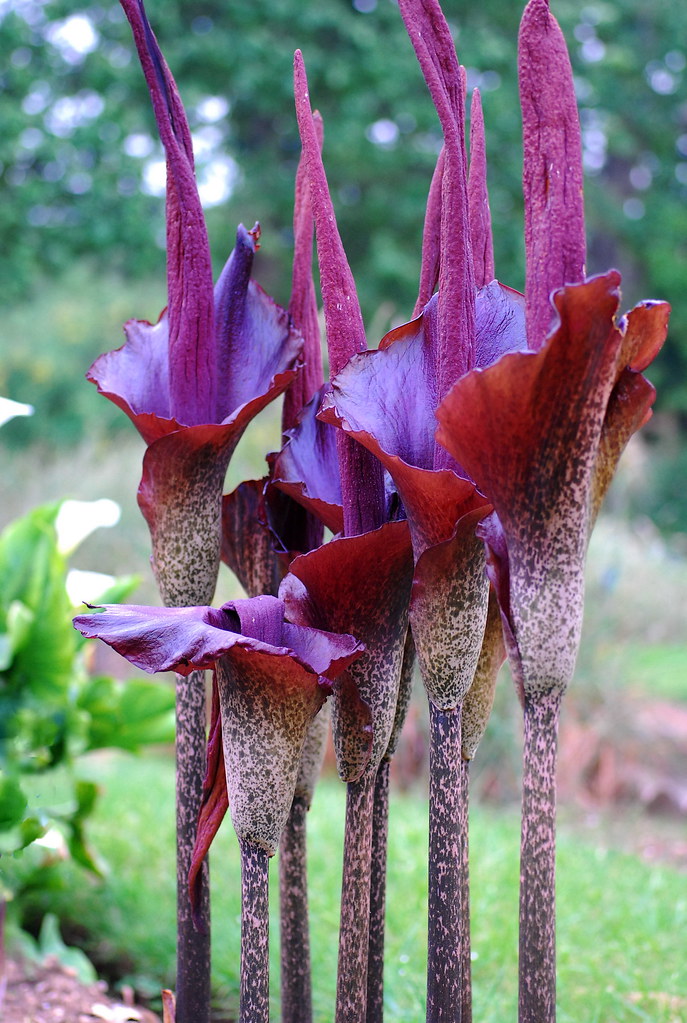
Amorphophallus rivieri, Konjac Une large spathe pourprevi… Flickr
Amorphophallus konjac is a perennial with an interesting lifecycle. This plant grows from a bulb-like structure known as a tuber, producing first a flower, then a large compound leaf, and then returning to dormancy. At an age of about 5 years, the tuber will be large enough to begin flowering.

What Is Amorphophallus Konjac? LEAFtv
Native to warm subtropical to tropical areas of eastern Asia, including Vietnam, Japan and China south to Indonesia, Amorphophallus konjac has been known by several other scientific names including A. rivieri, A. rivieri var. konjac, A. mairei, and Hydrosme rivieri as well as numerous common names including Devil's tongue, dragon plant, elephant.
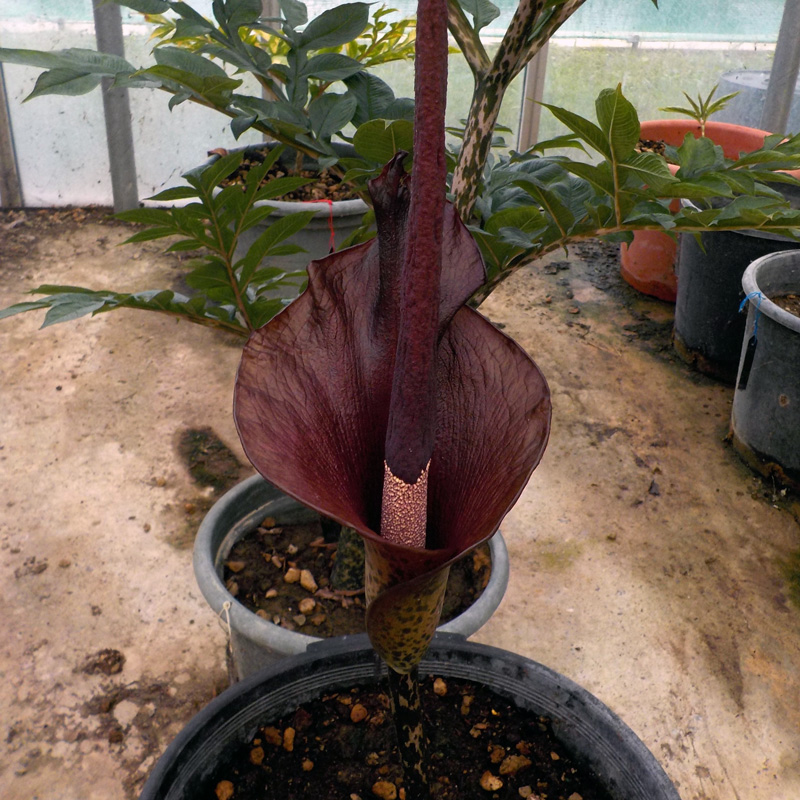
Amorphophallus rivieri A.Konjac Acquista online su Vivaibambù Store
Amorphophallus konjac (syn. A. rivieri) (ex: Jonathan Lehrer) - Amorphophallus konjac Is among the easiest Devil's Tongue or Voodoo Lily to grow; it is a good starting plant for any and all interested in this fascinating genus in the bizarre and fabulous aroid complex.

Amorphophallus rivieri A.Konjac Acquista online su Vivaibambù Store
If you want to grow an exotic-looking plant in your garden, try Amorphophallus rivieri, also known by another scientific name, Amorphophallus konja, and commonly called devil's tongue and voodoo lily. When this fleshy, frost-tender perennial blooms, it creates a visually striking and smelly statement in the garden.
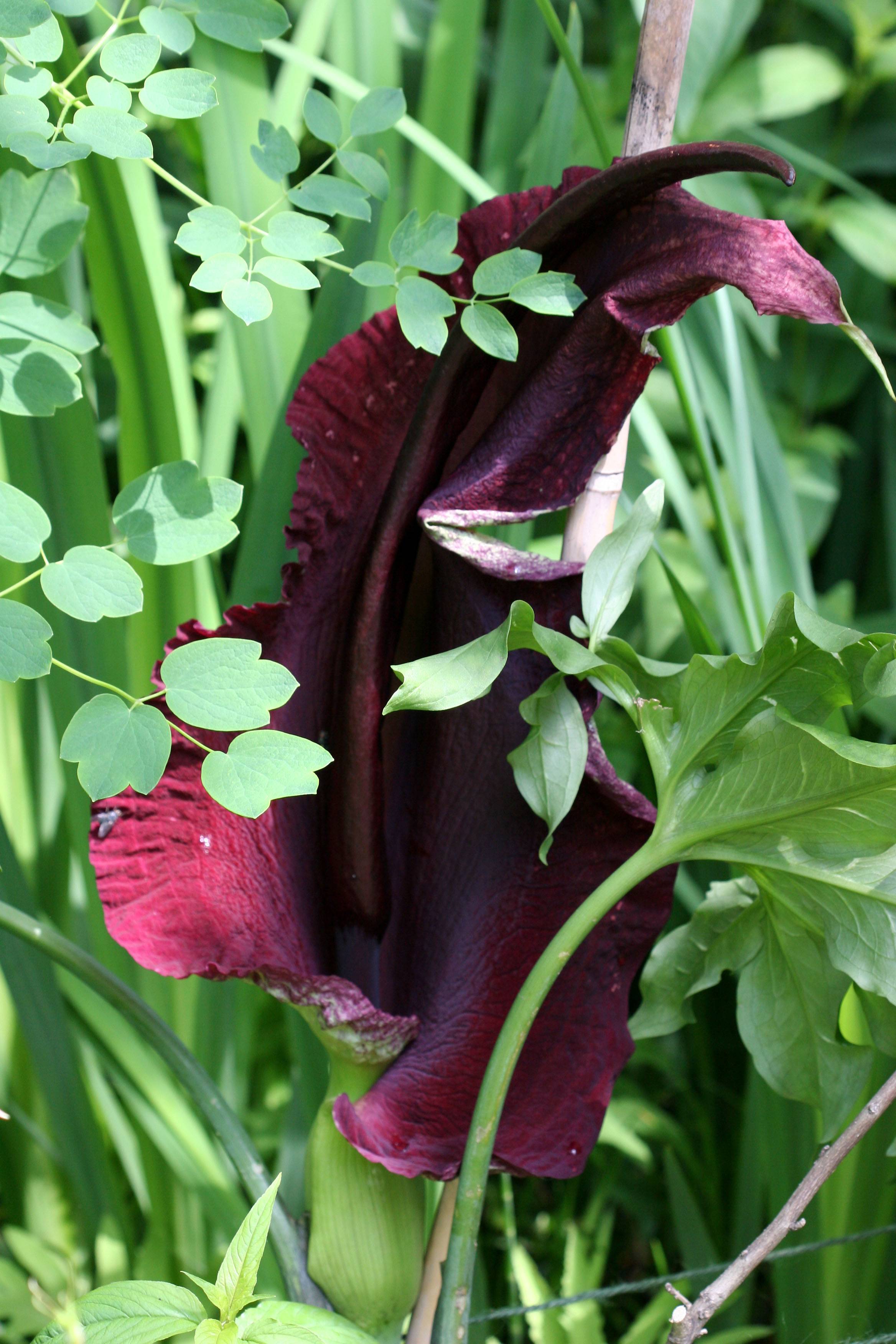
Amorphophallus rivieri 'konjac' photo Hubert Steed photos at
Amorphophallus konjac, (previously Amorphophallus rivieri) commonly called devil's tongue, konjaku, konnyaku, or voodoo lily, is an herbaceous, corm-producing perennial native to forest margins and open thickets from the southern Himalayas through southeast Asia.

Flower Gallery Elephant Foot コンニャク (蒟蒻、菎蒻 Amorphophallus rivieri var. konjac)
Amorphophallus Rivieri Konjac is on another level with extraordinary 5' reddish-purple blooms, and while it may take a couple of years for your bulb to flower, it's well worth the wait! In the meantime, you can enjoy watching as your plant becomes established by developing a forest of 6' tall mottled trunks and palm-like foliage.